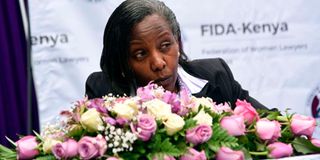Fida lists most unsafe counties for women

Fida Kenya Chairperson Nancy Ikinu listens during a function on August 3, 2022. Siaya, Kisumu and Nairobi are the country’s most hostile counties to women aspirants in the August 9 General Election campaigns, a new study by Fida has shown.
What you need to know:
- Nairobi, Siaya and Kisumu lead in a list of 14 counties that account for more than half of recorded attacks against women during campaigns.
- Fida said it recorded 745 attacks on women aspirants nationwide between April and June in a report released yesterday.
Nairobi, Siaya and Kisumu are the country’s most hostile counties to women aspirants in the August 9 General Election campaigns, a new study by the Federation of Women Lawyers-Kenya (Fida) has shown.
The three counties lead in a list of 14 that account for more than half of recorded attacks against women during campaigns.
Fida said it recorded 745 attacks on women aspirants nationwide between April and June in a report released yesterday.
Of these, Siaya recorded 59 while Kisumu and Nairobi had 40 cases each. Others in the list are Kericho, where 33 incidents have been recorded, Marsabit (33), Kisii (26), Nakuru (25), Vihiga (24), Busia and Narok (21), Kitui and Bomet (20), Uasin Gishu and Mombasa (19).
“We have been able to report, map and document incidents of sexual gender-based violence perpetration against women aspirants, voters and supporters. Social media has also presented an opportunity to report and document election related violence on a mass scale, providing information which could ordinarily not be accessed using traditional means,” said Christabella Naliaka, who is the monitoring and evaluation lead Fida.
Reporting portal
The organisation established a reporting portal that allowed 100 monitors in the 47 counties to provide real-time data regarding the situation on the ground from April 2022 to June, 30 which ensured data authenticity and timely responses.
According to the report, cultural events, which include church gatherings and funerals, recorded the highest number of cases reported. Online meetings followed closely while official government functions and fundraisers recorded less numbers.
“The online space remains a marketplace of ideas that contributes to development and requires protection for women from unnecessary interference and irresponsible users, especially through self-regulation and moderation by site managers and users,” Ms Naliaka said.
Fida chairperson Nancy lkinu said they have launched a physical and online elections observation centre to provide psychological and legal support.
“Our monitors have also been deployed across 47 counties to report, map and document incidents of gender-based violence against women aspirants, voters and supporters. Fida will be monitoring and issuing periodic statements on the issues that will be reported from the ground as part of early warning and response during these elections,” she said.
At the same time, the women’s rights group said the two-thirds gender rule remains a mirage.
“Vote A Dada” campaign
“This is despite the fact that the 2017 election had a higher number of women elected into both houses of the Parliament,” Ms Ikinu said. The lobby had last year launched the “Vote A Dada” campaign to advance the gender agenda.
“We have trained over 350 female aspirants, including the youth and women living with disabilities, on the various aspects of the electoral cycle to ensure they have the requisite capacity for greater participation in elective politics,” said Ms Ikinu.
In this election three female deputy presidential candidates, gubernatorial (23), deputy governor (57), National Assembly (340), senatorial (42) and 1,187 MCA candidates have been gazetted.





